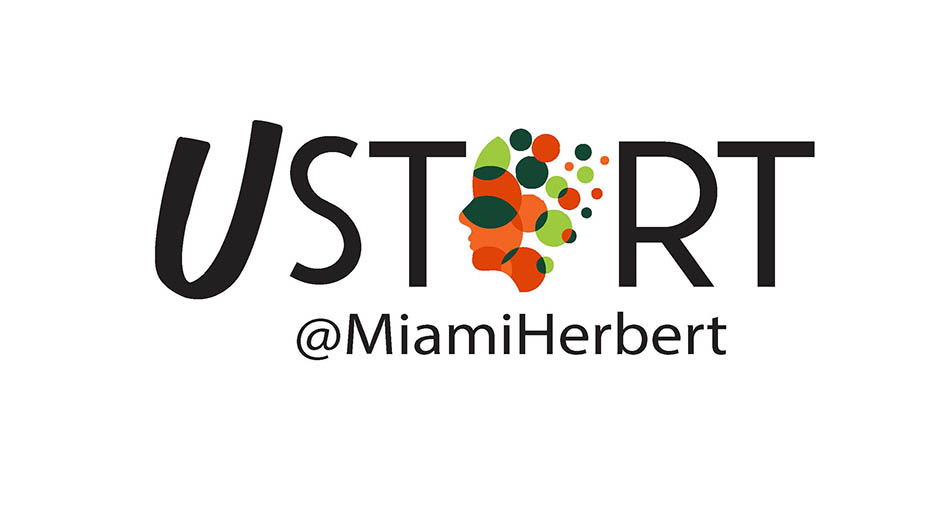Miami Herbert Business School continues to advance an environment of opportunity for students of all backgrounds, even beyond the University of Miami’s student base. Its newest faculty-led initiative, USTART@MiamiHerbert, signifies an immersive experience into the groundwork of founding a business for select future entrepreneurs from Historically Black Colleges and Universities (HBCUs) and Minority-Serving Institutions (MSIs) across the United States and the Caribbean. The inaugural residency program, taking place from Jan. 3 to Jan. 9, includes lectures, workshops, guest speakers, executive mentoring, and a business pitch competition with cash prizes.
USTART Academic Director and Professor of Professional Practice David Major, and School of Education & Human Development Associate Dean EllenMarie McPhillip developed the intensive program to encourage undergraduate students with business ideas or with the motivation for business ownership to follow a pathway towards becoming future founders.
“My parents taught my siblings and I to go out and get an education and a good job, and that was sound advice,” Major says, “but an even stronger message is, go out and figure out how to do something of your own; how to create something new that will be better for yourself, your family, and your community.”
The pathway will come with challenges, however, as Black youths in vulnerable populations who aspire to become business owners must contend with gaps in the venture capital ecosystem. According to Forbes, less than one percent of American venture capital goes to Black founders and African Americans fill only two percent of senior positions at venture capital firms.
“To really reap their full potential, black and brown communities have to have a much stronger and more sustainable entrepreneurial footprint,” McPhillip says regarding the program’s purpose to tackle the challenges head-on. “We need to prepare our students to create capital, access capital, and then create employment.”
USTART@MiamiHerbert helps face the barriers to entry and low representation in the investing space by giving minority students access to experts and mentors for the basis of a reliable network, the knowledge and resources to shape their business ideas, and a foundational understanding of how to tap into funding opportunities.
“The program not only offers access to an entrepreneurial education on an accelerated basis, but also makes the students immediately able to apply what they learn,” McPhillip explains. “It is an opportunity for them to actually see how their ideas can be converted into action and then that action be rippled out into the community to solve real problems.”
Class lectures span interdisciplinary topics within the context of entrepreneurship with participating faculty from Miami Herbert Business School, the College of Arts and Sciences, University of Miami Libraries, and Miller School of Medicine. During afternoon “Executive Mentor Office Hours” sessions, executives from corporate sponsors, including Morgan Stanley, Blue Mahoe, Channing Capital, and Deloitte, offer advice and guidance. Students also meet successful alumni and active entrepreneurs in Chicago, Minneapolis, and New York, and within Miami’s own Overtown district, which carries a rich history of Black culture and enterprise. Highlights also include a lively launch event featuring University of Miami Board of Trustees Chair Laurie Silvers, a finance lecture delivered by UM Treasurer & CIO Charmel Maynard, and an Awards Ceremony featuring UM Special Advisor to the President on Racial Justice, Donald Spivey, Ph.D.
A strong response from corporate and individual sponsors, community partners, University faculty, and administrative leadership enables growth prospects. Major and McPhillip envision growing the class from its initial size of 20 students to 40 among participants that demonstrate an interest in entrepreneurship and past volunteering service or community involvement. The leadership team also expects to position the program as a multiple offering throughout the year.
“The program is scalable by design,” Major states. “A duration of one solid week allows us to run it not just during winter break but perhaps also at the beginning of the summer, at the end of the summer, and during spring break.”
A plan for multiple installments throughout the year seems fitting for a team that has already proven resilient. The program underwent several iterations—from in-person to hybrid to fully online—as Major and McPhillip maneuvered through the latest and sudden COVID-19 surge. Yet with the experience, strong support, and a commitment to impacting the lives of future entrepreneurs, the USTART leaders are poised to help Miami Herbert remain at the forefront of inclusive educational opportunities and students to become, as Major describes, “the catalysts of their own destinies.”

